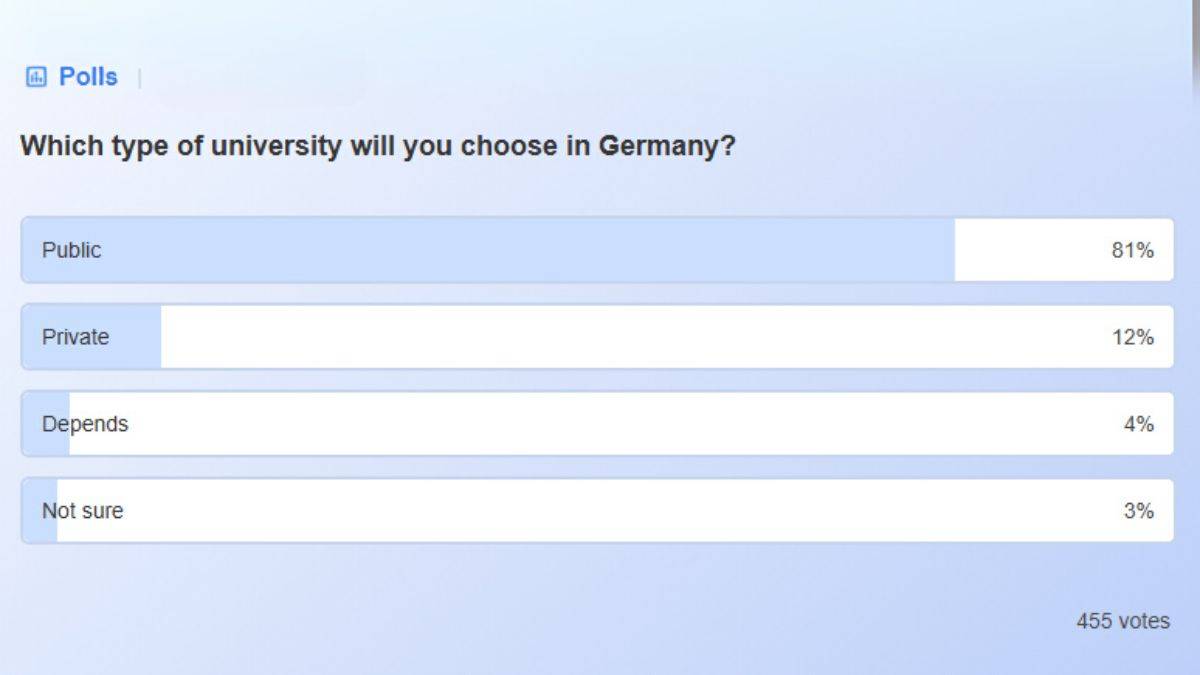Public vs Private Universities in Germany: Which University Should You Choose?
Germany is one of the top countries to study for Indian students. The main reason is it's quality education system and the chance to study at a low cost or sometimes even for free.
Public universities in Germany are funded by the government. They offer almost free education to both local and international students. While, private universities in Germany are tuition based and charge higher fees.
So, which type of German university is better for you? To help answer this, we also ran a student poll. Out of 455 votes, around 81% said they prefer public universities in Germany. Only 12% voted for private universities. The rest were unsure. In this article, we will explain the main differences between public and private universities in Germany. This will include fees, admission rules, and more. This will help you decide which one is the right fit for you.
- How much does it cost to study in public or private universities in Germany?
- How many programs are offered at public or private universities in Germany?
- Ranking of Public and Private Universities in Germany
How much does it cost to study in public or private universities in Germany?
Big difference between public and private universities in Germany is tuition fee. Most public universities in Germany are free. Students only need to pay a semester fee. It is usually around EUR 250 to 350.
When it comes to private universities in Germany, you have to pay the tuition fee. A simple MBA at Frankfurt School of Finance & Management will cost you around INR 42 Lakh.
Which semester should you start your studies in?
This is one of the most common questions for students planning to study in Germany: Winter semester or Summer semester?
Winter Semester in Germany
- Starts in October and ends in March
- This is the main intake
- Most courses are available
- Public universities accept more students
- Better chances of admission
That’s why most international students apply for the winter semester. If you want more course options and better admission chances, go for the winter intake in Germany.
Summer Semester in Germany
- Starts in April and ends in September
- Fewer courses are offered
- Not all programs are available
- Limited intake of students
But don’t worry, if your dream course is offered in the summer intake in Germany, just apply! Some students prefer this intake because there’s less competition.
How many programs are offered at public or private universities in Germany?
The difference between public and private universities in Germany is the number of study programs. Germany has a total of 428 higher education institutions, among which 313 are public and 115 are private. Out of these, public universities offer 90% of all study programs in the country. That means if you're looking for variety, public universities give you more options.
Predict your IELTS, TOEFL, and PTE in just 4 steps!
If you look at the courses offered at the different universities in Germany, you will have a clear idea of which is offering what.
- Ludwig Maximilian University of Munich (public): Offers over 200 academic programs across many fields, including natural sciences, humanities, law, medicine, and social sciences.
- ESCP Business School (private): Offers less than 15 degree programs in specialized business areas (official source: ESCP).
This clearly shows that public universities in Germany have a much wider selection of courses, from Engineering and Medicine to Arts, Humanities, and Social Sciences.
Ranking of Public and Private Universities in Germany
Check out the ranking of the top-ranked German universities with latest rankings:
| German Universities |
QS World University Rankings 2026 |
|---|---|
| Technical University of Munich (Munich, Germany) |
22 |
| Ludwig Maximilians University Munich (Munich, Germany) |
58 |
| (Heidelberg, Germany) |
80 |
| (Berlin, Germany) |
88 |
| (Aachen, Germany) |
105 |
| Karlsruhe Institute of Technology (KIT) (Karlsruhe, Germany) |
98 |
| (Berlin, Germany) |
130 |
| Technical University of Berlin (TUB) (Berlin, Germany) |
145 |
| (Hamburg, Germany) |
193 |
| Albert Ludwigs University of Freiburg (Freiburg im Breisgau, Germany) |
201 |
| (Tübingen, Germany) |
215 |
All of these have strong records in research, teaching, and international reputation.
On the other hand, private universities in Germany are not as high in the rankings, but that doesn’t mean they are bad. Some, like ESMT Berlin or Jacobs University Bremen, are known for modern facilities, industry links, and small class sizes.
List of Top Private Universities in Germany
| University |
Tuition Fees |
|---|---|
| INR 23 Lakh to INR 32 Lakh |
|
| Up to 20 Lakh |
|
| INR 8 Lakh to INR 23 Lakh |
|
| Up to INR 35 Lakh |
|
| Munich Business School |
INR 23 Lakh to INR 39 Lakh |
| INR 33 Lakh to INR 46 Lakh |
|
| From INR 7 Lakh |
|
| Charité – Universitätsmedizin Berlin |
INR 10 Lakh to INR 16 Lakh |
| Katholische Universität Eichstätt – Ingolstadt |
INR 7,313 per semester (or INR 14,626 per year) |
| University of Witten/Herdecke |
INR 9.05 Lakh |
| SRH Berlin |
INR 6.96 Lakh - 14 Lakh |
Many public universities in Germany ask for higher marks, especially in popular courses. But if the course doesn't have NC (Numerus Clausus), and your other documents are strong, you still have a chance.
Yes, 320 is a very strong score for Germany. Most German universities look for a score around 300 to 310. If you have 320, you are well above average. It will help you get into top schools like TU Munich or RWTH Aachen. Focus more on the Quant score for engineering courses.
Pick your stage and get free guidance from counsellors who've helped thousands get into top universities.
 Starting research
Starting research Shortlisting colleges
Shortlisting colleges Exam preparation
Exam preparation SOP/LOR writing
SOP/LOR writing Scholarship & finance
Scholarship & finance Visa application
Visa application



Public universities are better if you want to save money and get more course options. But private universities give you more personal support, modern classrooms, and faster application process. Both are good in their own way.